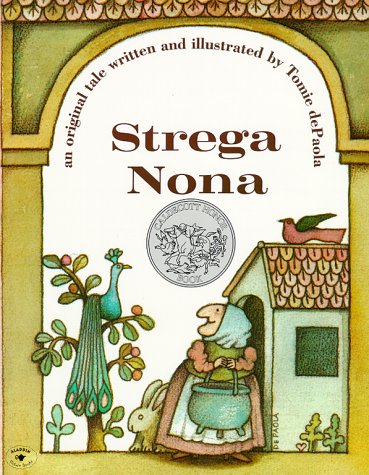 Strega Nona by Tomie dePaola
Strega Nona by Tomie dePaola
(Suggested reading level: Ages 4-8)
I’ve read many of dePaola’s Strega Nona stories with Amber over the years. They are all sweet, delightfully illustrated and filled with a kind, gentle touch of magic.
Today’s Fairy Tale Friday selection is the original Strega Nona, which I don’t remember reading before, but it’s a perfect story for me.
In a town in Calabria, a long time ago, there lived an old lady everyone called Strega Nona, which meant “Grandma Witch.”
Although all the people in town talked about her in whispers, they all went to see her if they had troubles. Even the priest and the sisters of the convent went, because Strega Nona did have a magic touch.
Even though she has a touch of magic, she’s so kind and considerate everyone in the village trusts her. Strega Nona hires Big Anthony to help out around her house and garden, warning him never to touch the pasta pot. Big Anthony learns, by peeking through the window, that the pot is magic. Strega Nona sings a few lines and the pot fills with steaming hot pasta. When there is enough, she sings again to make it stop. She also blows three kisses to the pot, but Big Anthony misses that.
Of course, you can see where this is going. One day Strega Nona leaves town for the day, and Big Anthony decides to make pasta. He makes enough for the entire town and all the villagers are amazed and thankful, until the pot begins to overflow. Big Anthony doesn’t know the secret to stopping it, so pasta begins to cover the town. Luckily Strega Nona arrives home, immediately knows what happened and stops the pasta. She gives Big Anthony a fork and pronounces his punishment, which fits the crime perfectly.
“All right, Anthony, you wanted pasta from my magic pasta pot,” Strega Nona said, “and I want to sleep in my little bed tonight. So start eating.”
I may have mentioned before that I love pasta. I could eat spaghetti everyday, or maybe linguini one day, ravioli the next, egg noodles for lunch, spaghetti pizza at the mall. I will literally eat three plates fulls of my mom’s spaghetti and sauce when she has us over. So, I guess, for me at least, the moral here really has nothing to do with leaving other people’s things alone, it’s that there is such a thing as too much pasta. I even have trouble writing that phrase. Now I’m sitting here wondering if there’s any pasta in the cupboard I can cook for dinner. I need one of those pots!
Tif, from Tif Talks Books, is the hostess of this great feature, Fairy Tale Fridays. Head over there later today to see what she has to say and to share your own thoughts. Next week, we’ll be looking at “The Boy who Cried Wolf” by Aesop.
First published in 1975
Caldecott Honor 1976
32 pages
Challenges: 100+
I borrowed my copy from the library and the above is my honest opinion. I am an Amazon associate.
I read this with my daughter awhile back. We loved it!
–Anna
I loved borrowing this book from the library for my kids. I believed they enjoyed it as I did!
Lol, too much pasta, good moral there
this does sound very cute!
LOL!!! I love your moral!!! There is such a thing as too much pasta?!? I’m not really sure I can get on board with that!! 🙂